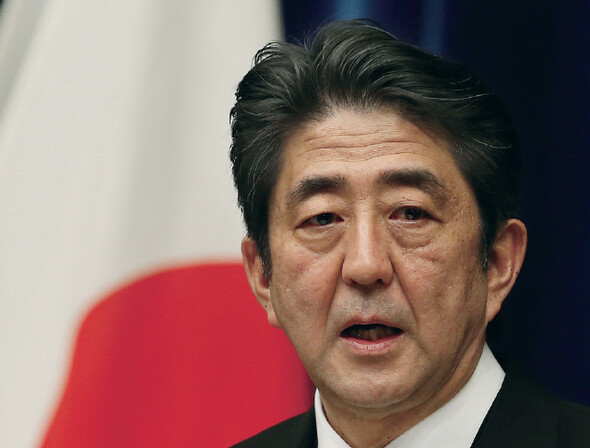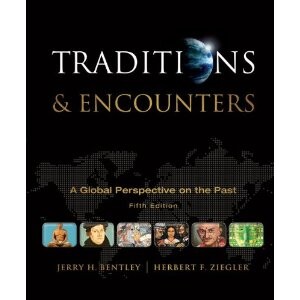hankyoreh
Links to other country sites 다른 나라 사이트 링크
Abe again tackling US history textbook’s handling of comfort women issue

The historical understanding of Japanese Prime Minister Shinzo Abe is once again under scrutiny.
As debate rages among Japanese politicians and newspapers over Abe’s remarks about the expressions he will use in the “Abe Statement,” marking the 70th anniversary of Japan’s surrender in World War II, Abe said that he was “shocked” by how American textbooks deal with the issue of the comfort women. Abe’s remarks are expected to cause more controversy.
On Jan. 29, during a meeting of the budget committee at the House of Representatives, the lower house in Japan’s Diet, Abe said that he had been “really shocked” by how comfort women were described in a US public high school textbook.
“Our failure to correct the impression in the international community that the comfort women were forcibly recruited is allowing this kind of textbook to be written,” Abe said, emphasizing that he would more aggressively request for such passages to be revised.
“Staying quiet isn’t going to improve our reputation in the international community. We need to stand up for what matters,” Japanese newspaper the Yomiuri Shimbun quoted Abe as saying.
In short, Abe emphasized that he would increase demands that descriptions of the comfort women in American textbooks be corrected.

The textbook in question that Abe found so shocking was a world history textbook called “Tradition and Encounters,” published by McGraw Hill, which is used in public high schools in Los Angeles.
The textbook says that as many as 200,000 women between 14 and 20 years of age were forcibly recruited and pressed into service by the Japanese army to work at the comfort stations. Some of these women were killed trying to escape, the textbook also says.
At the beginning of this year, the Japanese Foreign Minister officially requested McGraw Hill to revise the passages in question, but the company did not comply.
Concerns about the attitude of the Abe administration toward historical issues are also being voiced by the US government.
“Abe’s approach to issues like the so-called ‘comfort women’ forced prostitutes from the World War II era, [. . .] visits to the Yasukuni Shrine that honors Japan’s war dead and includes Class A war criminals, and statements on territorial disputes in the Sea of Japan and the East China Sea are all ongoing points of tension in the region,” the US Congressional Research Service (CRS) said in a report titled “Japan-U.S. Relations: Issues for Congress” published on Jan. 20.
According to the CRS, Abe’s remarks are “setting off speculation in the region that the planned [Abe Statement] may stop short of a forthright apology.”
The report concludes that Abe seems to hold “a revisionist view of Japanese history that rejects the narrative of Imperial Japanese aggression and victimization of other Asians,” the Asahi Shimbun said in a story quoting the CRS report.
An earlier CSR report published in Sep. 2014 accused the Abe administration of compromising American interests in East Asia by continuing to prod historical sore points.
And on Jan. 5, US State Department spokesperson Jen Psaki expressed the hope that the Abe would support the Kono Statement of 1993 and the Murayama Statement of 1995.
By Kim Ji-eun, staff reporter
Please direct questions or comments to [english@hani.co.kr]

Editorial・opinion
![[Column] Has Korea, too, crossed the Rubicon on China? [Column] Has Korea, too, crossed the Rubicon on China?](https://flexible.img.hani.co.kr/flexible/normal/500/300/imgdb/original/2024/0419/9317135153409185.jpg) [Column] Has Korea, too, crossed the Rubicon on China?
[Column] Has Korea, too, crossed the Rubicon on China?![[Correspondent’s column] In Japan’s alliance with US, echoes of its past alliances with UK [Correspondent’s column] In Japan’s alliance with US, echoes of its past alliances with UK](https://flexible.img.hani.co.kr/flexible/normal/500/300/imgdb/original/2024/0419/2317135166563519.jpg) [Correspondent’s column] In Japan’s alliance with US, echoes of its past alliances with UK
[Correspondent’s column] In Japan’s alliance with US, echoes of its past alliances with UK- [Editorial] Does Yoon think the Korean public is wrong?
- [Editorial] As it bolsters its alliance with US, Japan must be accountable for past
- [Guest essay] Amending the Constitution is Yoon’s key to leaving office in public’s good graces
- [Editorial] 10 years on, lessons of Sewol tragedy must never be forgotten
- [Column] A death blow to Korea’s prosecutor politics
- [Correspondent’s column] The US and the end of Japanese pacifism
- [Guest essay] How Korea turned its trainee doctors into monsters
- [Guest essay] As someone who helped forge Seoul-Moscow ties, their status today troubles me
Most viewed articles
- 1[Column] The clock is ticking for Korea’s first lady
- 2[Correspondent’s column] In Japan’s alliance with US, echoes of its past alliances with UK
- 3After 2 months of delayed, denied medical care, Koreans worry worst may be yet to come
- 4[Column] Has Korea, too, crossed the Rubicon on China?
- 5[Editorial] When the choice is kids or career, Korea will never overcome birth rate woes
- 6Samsung barricades office as unionized workers strike for better conditions
- 7US exploring options for monitoring N. Korean sanctions beyond UN, says envoy
- 8US overtakes China as Korea’s top export market, prompting trade sanction jitters
- 9[Photo] Smile ambassador, you’re on camera
- 10Hong Se-hwa, voice for tolerance whose memoir of exile touched a chord, dies at 76